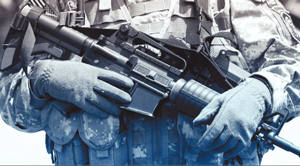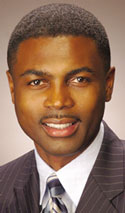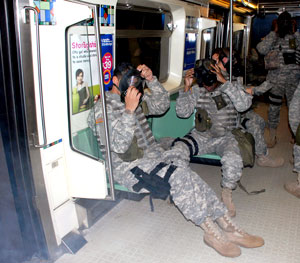Urban violence brings renewed calls for National Guard deployment
By Ashahed M. Muhammad -Asst. Editor- | Last updated: May 7, 2010 - 10:18:31 AMWhat's your opinion on this article?

‘Gang activity and its resulting violence has taken a toll on my community for far too long. We need action now.’ —Rep. Lashawn Ford Illinois House of Representatives |
“Gang activity and its resulting violence has taken a toll on my community for far too long,” stated Illinois State Representative Lashawn Ford, a Democrat. “The Military Code of Illinois specifically states that it is the duty of the governor to deploy such force as he deems necessary in order to suppress individuals acting together and committing violence in violation of our laws. Enough is enough. We've already lost too many lives. We need action now.”
At a joint press conference on April 25, Rep. Ford and fellow Illinois House of Representatives Democrat John Fritchey called upon Governor Pat Quinn to bring in National Guard troops to bolster the presence of law enforcement in areas of the city that have been the hardest hit by crime.

Rep. Lashawn Ford, Illinois House of
Representatives
|
The sense of urgency in Rep. Ford's words is surely caused by the pressure of his constituents. Rep. Ford's 8th District encompasses parts of Chicago's West Side, specifically, a notoriously violent neighborhood called Austin. By contrast, Rep. Fritchey's 11th District encompasses parts of the city's more affluent North Side.
The statistics are alarming. Approximately 80 percent of the murder victims have been Black, and, according to Chicago Police Superintendent Jody Weis, most violent crime occurs in just 9 percent of Chicago's blocks. However, Supt. Weis, who served six years in the military, is on record as being against bringing in the National Guard.
Rep. Ford told The Final Call his call for the National Guard should not be looked upon as a slight or a criticism of Chicago Police Supt. Jody Weis, nor is it a call for heavily armed military personnel menacingly walking the streets, however, it is clear that Supt. Weis and the Chicago Police need help.
“If you say that you need the National Guard, you can very well possibly need some federal dollars to get some help with the police, but if you are telling everyone that you don't need any help, then you eliminate your chances for possibly lobbying for federal dollars,” said Rep. Ford. “If you say that you can't solve the 9 percent, then one thing that you can do if you have more bodies, then you will be able to deter crime in those areas because you have more presence,” he added.
Just one year ago, Supt. Weis and law enforcement officials took credit for the fact that homicides had dropped 20 percent in Chicago for the first four months of 2009 compared with the same four-month period in 2008. By the end of April 2009 there were 108 homicides, 26 fewer than for the same period in 2008. Supt. Weis credited the work of his officers, and the establishment of several specialized crime units directly targeting street organizations and crime hot spots.
In the summer of 2009, Supt. Weis ordered all plainclothes officers to wear their full uniform when on duty. This included many gang enforcement and tactical officers. The department also held a highly publicized series of roll calls in order to show the community that Chicago police would be more visible. He also redeployed many administrative officers to street patrols. The department has ordered more powerful weapons, expanded the use of Taser guns, and Chicago's “blue-light” cameras appear to be almost everywhere.
Recently, he announced the establishment of a rapid-response technology initiative which will make a block-by-block computer crime data analysis available to patrol officers.
In 2010, 113 people have been killed in Chicago, the exact number of those killed during combat in Afghanistan. In the most recent embarrassment, an April 2 press conference being held by Supt. Weis at the location of an earlier shooting was abruptly ended when gunfire from another shooting erupted in the vicinity. Recently, a 20-month-old girl was killed by a bullet intended for her father.
Shortly after the death of Derrion Albert in September 2009, the Rev. Jesse Jackson called for the National Guard to be brought into the city. Many community activists criticized him and decried the notion, however, now, some seven months later, many are asking, why not a coordinated military effort in violent areas, especially if nothing else has worked?
Pat Hill, a justice studies professor at Northeastern Illinois University and the executive director of the African-American Police League, believes those calling for the National Guard are “cowards.”
“Specifically, those who are 50 and older know better because we have experienced and witnessed the National Guard being used domestically,” said Prof. Hill, also a retired Chicago police officer. “If we recall after the assassination of Dr. King, in New Jersey the National Guard killed 60 people. I don't understand how the elders could go for this. If you think the police will shoot you … the National Guard will kill you and that's really all there is to it! Those who are calling for the National Guard are cowards. I think they don't want to deal with it. They know that the National Guard will kill our kids,” she said.
Long-time Austin resident Dorothy Jones, 71, disagrees. She told The Final Call she is in favor of the call to bring in the National Guard. She has lived in the West Side neighborhood for over 30 years and has watched it transform from a place where young children could play outside, to a place where most residents are afraid to leave their homes. She has four grandchildren and said she worries about their safety constantly.
“They can't play, they can't go outside and ride their bikes, you have to wonder and worry and pray that they will be safe!” said Ms. Jones “They can't do things that we did as children. They are held hostage.”
Street Gangs: The New Insurgents?
In a report titled “Street Gangs: The New Urban Insurgency” written by Dr. Max G. Manwaring, a Professor of Military Strategy in the Strategic Studies Institute (SSI) of the U.S. Army War College, he drew a parallel between “contemporary criminal street gangs” and the insurgencies that are seen in Iraq and Afghanistan “in terms of the instability it wreaks upon government and the concomitant challenge to state sovereignty.”
Prof. Manwaring points out that that in many cases the ultimate objective of many gangs and/or organized “non-state actors” have as their ultimate objective, destabilizing or deposing the current governmental authorities in order to create a condition of lawlessness that would allow them to control the areas in question. This would enable them to either establish or continue their illicit commercial enterprises such as narcotic sales and intimidation of business owners unhindered by a coordinated governmental response. Control of this “nonstate battle space”—as termed by Prof. Manwaring—such as an urban environment allows for the establishment of psychological dominance and rule by fear of the residents of the area.
In describing the importance of understanding the “half-criminal and half-political nature of the gang phenomenon,” Prof. Manwaring writes that many leaders underestimate the potential consequences of failing to act against these “nontraditional political actors.”
“At best, many leaders consider these nontraditional political actors to be low-level law enforcement problems, and, as a result, many argue that they do not require sustained national security policy attention.Yet, more than half of the countries in the world are struggling to maintain their political, economic, and territorial integrity in the face of diverse direct and indirect nonstate―including criminal gang―challenges.”
He continues, “The violent, intimidating, and corrupting activities of illegal internal and transnational nonstate actors―such as urban gangs―can abridge sovereign state powers and negate national and regional security.”

New York Army National Guard soldiers assigned to Joint Task Force Empire Shield, a state Army and Air National Guard security force operating in New York City, don protective masks as smoke fills a subway car simulator during emergency training conducted at the Metropolitan Transit Authority. Photo Courtesy, U.S. Army
|
They are asking for National Guard troops to be deployed with the “very clear guidance of proper rules of engagement and should be armed and allowed to defend themselves if fired upon or attacked.”
Critics see this as a dangerous, not only for ordinary citizens but also for law enforcement officials. National Guard troops are routinely deployed in cases such as natural disasters, however, for them to be deployed in the case of actual law enforcement and patrols other than during a national emergency, such as an urban rebellion, would be unprecedented.
For the time being, Gov. Quinn has rejected the idea of sending in the National Guard to supplement the Chicago police. In a recent press conference, Chicago Mayor Richard M. Daley said the problem is the amount of guns on the street and in the hands of criminals.
This is a position shared by Michael Walsh of the Illinois Campaign to Prevent Gun Violence (ICPGV). He believes calls for the National Guard are a sign of growing frustration with violent crime levels, but not the solution.
“Its just the frustration that something needs to be done. We can't go through another week and every time you turn around there's another report of senseless gun violence. At the same time, before we get to bringing in the National Guard and having a military presence on our streets, there are other things that we can be focusing on to get those guns off the street.”
The ICPGV is active in pressuring state and federal courts to tighten restrictions on gun ownership and strengthening penalties for illegal gun sales and ownership. In addition, anti-gun activists are calling on Congress to reinstate the federal ban on semi-automatic assault weapons, which expired in 2004.
“My neighbor across the street got shot in the stomach last August by a 14-year-old kid,” said Mr. Walsh. “There are just too many guns in the wrong hands.”
Related links:
Street Gangs: The New Urban Insurgency (Dr. Max G. Manwaring, U.S. Army War College)
INSIDE STORIES AND REVIEWS
-
-
About Harriett ... and the Negro Hollywood Road Show
By Rabiah Muhammad, Guest Columnist » Full Story -
Skepticism greets Jay-Z, NFL talk of inspiring change
By Bryan 18X Crawford and Richard B. Muhammad The Final Call Newspaper @TheFinalCall » Full Story -
The painful problem of Black girls and suicide
By Charlene Muhammad -National Correspondent- » Full Story -
Exploitation of Innocence - Report: Perceptions, policies hurting Black girls
By Charlene Muhammad -National Correspondent- » Full Story -
Big Ballin: Big ideas fuel a father’s Big Baller Brand and brash business sense
By Bryan Crawford -Contributing Writer- » Full Story






 Click Here Stay Connected!
Click Here Stay Connected!








